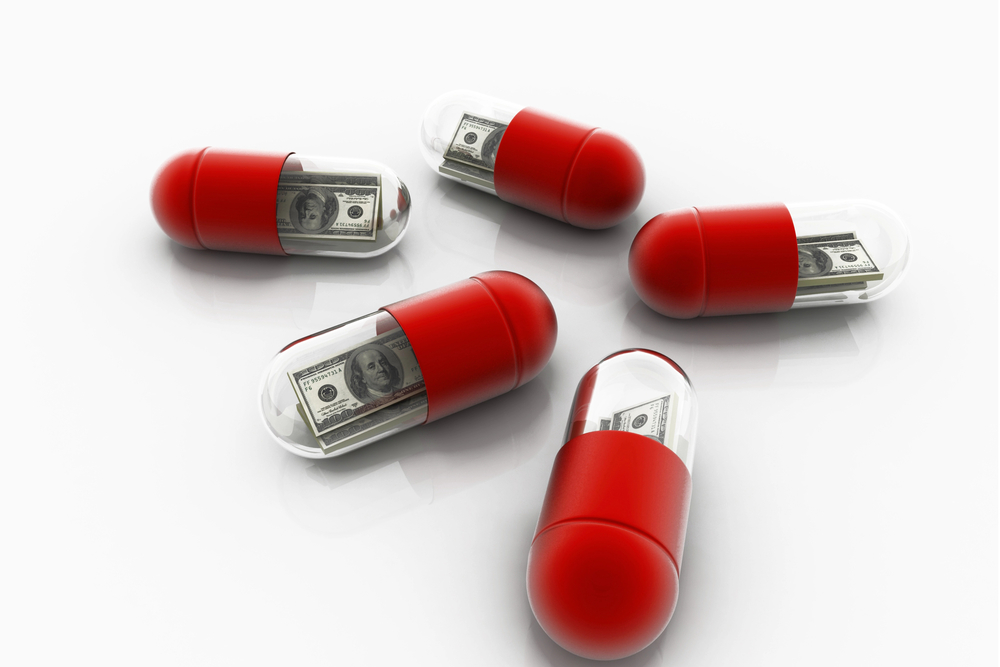In a recent study, researchers aimed to discover how much of the antidepressant research literature is valid and how much is “hijacked for marketing purposes.” They looked at the largest, most influential clinical trials of antidepressants and found that almost half were so biased that they could be considered “seeding trials”—or studies that provide marketing materials for the pharmaceutical industry, not valid scientific data.
“Large trials are rare in the field of antidepressant research. In the few existing trials, key outcomes such as suicidality and the functional impact of mental disorders were little studied. A significant proportion of these trials could be marketing trials (‘seeding trials’),” the researchers write.
The study, led by Samuel Martineau at the University of Rennes, France, was published in BMJ Open. The researchers also included Florian Naudet and Ioana-Alina Cristea, who have co-authored previous studies on how pharma undermines drug regulators in multiple ways as well as how medical journals make biased publication decisions.
















It pisses me off the way psychiatry ducks responsibility for the proliferation of people needlessly prescribed psychiatric drugs because if there were no DSM (created by psychiatrists!) there’d be no way for physicians to legally prescribe psychiatric drugs.
Which means one thing: Psychiatry alone hold the keys to the Gates of Hell.
Report comment
I knew someone who worked at a drug trial company. She told me that if pharma didn’t like the results of a drug trial, they (pharma) would use a different drug trial company’s until they got the results they were looking for. The FDA only looks at the current drug trial, they don’t look at any past drug trials when approving any drug.
Report comment
It’s safe to assume that many if not most medical journals aren’t what they pretend to be, that these are actually tools of propaganda kept afloat by pharmaceutical ads which, in turn, do a wonderful job of keeping the magazine’s editors more than fat and happy.
Report comment
Where’s the rest of the article? Is it really only two paragraphs. I signed in & there’s still only two paragraphs
Report comment
Two paragraphs is how long the article is. It cited the study in the first sentence and then states the results. Sometimes the articles are shorter than others.
Report comment
To read the full article, you need to be a subscriber/donor to Mad in America. You should see a box below the two paragraphs informing you that the full article is available only to subscribers to Mad in America ($20 annual subscription for $5 per month.)
Report comment
Robert, I DO pay you $5.00 every month.
Report comment
I donate every month yet the same thing happens to me.
Report comment
Seems like they ought to fix that right away. Or they will loose this fine online magazine. I’d hate to see that happen.
Report comment
If one wants to know about validity and sensitivity of antidepressants drug trials, Cochrane reviews which are free and online will provide information about them. The largest antidepressant trial was the STAR D trial whose information is the subject of many reports and further trials. It used the generic citalopram. Overall in its four levels 65 percent of patients went into remission and 35 % did not. Partial response without remission generally led to relapse.
Report comment
Yes. The STAR D trial was recently debunked for the second time.
Report comment
STAR*D has been reviewed and reanalyzed several times. Read the reviews here on Mad in America which point out many flaws. There are many issues with the frequently cited remission percentages.
Report comment
Yes I read mad in America article and the underlying study. It is important to note that the Star D study is almost 20 years old.We now know far more about depression and have new treatment options . One of the recent discoveries is the efficacy of brexanalone, which is not an ssri , for post parturition depression. Another is that depression is not one disorder . It has genetic vulnerability for treatment resistance, especially in families where parents and relatives have persistent depressive disorder. It sometimes is the first symptom of underlying dementia, Parkinson’s disease, and underlying adverse childhood experiences. Some cases of depression are in fact bipolar depression which generally do not respond to a or depressants. We now have TMS, trans cranial magnet stimulation, deep brain stimulation, vagal nerve stimulation, as new treatments, and the use of antipsychotic agents to augment ssri or snri treatments. We also know that DSM 5 defined personality disorders complicate response to anti depressants, and that often multiple approaches are needed for treatment response. Most of all, we know that depression is like many long term illnesses with inflammatory components, and that remission and relapse can occur throughout the life span. This new state of affairs calls for investigating the multiple subtypes of depression and their response to recovery and maintaining it.
So it would seem that the reviews of the star d trial are a great basis for new focused treatment studied
Report comment
The fact that there is newer research has no bearing on the clear attempt to falsify the data in the study. Doesn’t that concern you? That the studies aren’t reporting the truth?
Report comment
The truth as a scientific principle is to report what the studies show at the time. Then when there is new data, study the data points again. The history of scientific investigation is like that. Newtons gravitational findings replaced by Einstein’s theory of special and general relativity, and questioned by Neil’s Bohr’s findings about whether light is a wave or a particle , and now multiple issues about dark matter and dark energy. Science presumes that truth is a process of investigation….
Report comment
Did you read about the Star-D study? It wasn’t wrong or incomplete data. They ALTERED the outcomes. They LIED about the results. That’s different from being overridden by new and more accurate data. Do you just not want to accept that fact?
Report comment
This is to Kim. (Sorry steve) There is a huge difference between manipulating research findings to favor your original hypothesis and then denying you did and refusing to re-analyze it when your mistakes were shown to you and how science progresses over time.
Lying is lying no matter how much time passes or how many other scientists discover new things.
Ethics is the one thing that will never change.
Report comment
I’m sorry, but I do not see it that way. Any report of a study such as Star D has multiple authors and multiple conclusions that can and should be evaluated in terms of current knowledge. I suppose if you asked research scientists about the Star D reports, they might point out that they are 20 years old and that their conclusions should always be subject to review. That would include comments about methods, findings, and conclusions.
It usually helps in science to ask questions and study them. In light of this process, it would seem an outlier to suppose that the Star D study was promoted to sell antidepressants or come to similar conclusions, as there are no studies about that particular claim. There were dozens of researchers and clinicians involved in the Star D study, including those who did psychosocial therapies, and there are important conclusions that the Study produced, including the length of time before switching agents and that whatever agent was used in the switch was not more effective than medications in the same class. I have read lots of studies and written some, and I do not remember any of them using words like truth and lies; rather, they are accurate or inaccurate with data review and an invitation to respond… I have not seen any responses from the STAR D principals, but that would be interesting information.
Report comment
You are denying reality. The point of the articles is that the Star-D has falsified outcomes. If you choose not to believe that (belief is not science) that is up to you, but don’t try to claim that later science is responsible for updating fraud. When the authors have been confronted with their false conclusions they have doubled down, not reconsidered. It was a handy conclusion that people like you want to believe, so they believe it.
Report comment
Well I guess we will have to agree to disagree. Best wishes
Report comment
Kim, here’s something that might interest you if you happen to be in a receptive state of mind:
“Most experts in the field of psychiatry recognize that neuroscience advances have yet to be translated into clinical practice. The main message delivered to laypeople, however, is that mental disorders are brain diseases cured by scientifically designed medications. Here we describe how this misleading message is generated. We summarize the academic studies describing how biomedical observations are often misrepresented in the scientific literature through various forms of data embellishment, publication bias favoring initial and positive studies, improper interpretations, and exaggerated conclusions. These misrepresentations also effect biological psychiatry and are spread through mass media documents. Exacerbated competition, hyperspecialization, and the need to obtain funding for research projects might drive scientists to misrepresent their findings. Moreover, journalists are unaware that initial studies, even when positive and promising, are inherently uncertain. Journalists preferentially cover them and almost never inform the public when those studies are disconfirmed by subsequent research. This explains why reductionist theories about mental health often persist in mass media even though the scientific claims that have been put forward to support them have long been contradicted. These misrepresentations affect the care of patients. Indeed, studies show that a neuro-essentialist conceptualization of mental disorders negatively affects several aspects of stigmatization, reduces the chances of patients’ healing, and overshadows psychotherapeutic and social approaches that have been found effective in alleviating mental suffering. Public information about mental health should avoid these reporting biases and give equal consideration to the biological, psychological, and social aspects of mental health.”
Messaging in biological Psychiatry: Misrepresentations, Their causes, and Potential Consequences, from the Harvard Review of Psychiatry
Report comment
Thank you for your message. As I said in my last email, we will have to agree to disagree.
As far as neuroscience scans, genome studies, pharmacodynamics , kinetics, etc., are incorrectly viewed as telling scientists how to treat disease. In fact, these studies look at existing diagnoses and treatments and tell us what is happening in the brain. Thus, we can see differences in types of dementia, the pathways activated in Obsessive-compulsive disorders, the genetic relationship with suicide in families, etc. The same sort of information is also what we use when science studies prostate cancer, leukemia, etc etc.
The idea that psychiatry exists to create careers for scientists and make money for drug companies assumes that diseases and their treatments exist because of profit, when in reality, people are searching for treatments and an understanding of disease. When I was in medical school, one of the preceptors said,” That if you go into medicine to cure people, you are in the wrong profession. Medicine is, at best, an attempt to alleviate suffering.”
Diagnosis of mental illness has always been the source of debate from ancient times. Thomas Szasz ” The Myth of Mental Illness,” is a likely ancestor of Mad In America. That said, several important issues are relevant.
First, the accuracy of diagnoses has improved over the years with the publishing of reliability, confidence limits of false positive results, and sensitivity, confidence limits of false negative results. These measures tell us the limits of diagnostic criteria.
Second, in terms of Therapeutics, all medicines that the FDA approves need to show at least a 10% efficacy rate, or number needed to treat of 10, and at the same time an acceptable risk rate ( Number needed to harm). In cases where harm includes death, usually, the medication will not be approved unless special indications are met. However, a 10% efficacy rate means that only one patient in 10 responds to a medication and the rest do not. It is not a surprise that all medications, including those in general medicine, have a high failure rate.
Third, George Engel, describe the Bio, psycho, social context in the treatment of mental illness. That is a current standard of practice. Data from treatment studies in depression, psychosis, and mood disorders show consistently that affecting social, psychological, and biological elements is more effective than any of these elements alone.
We now have a focus in mental illness on the public health model. This is primary prevention, strategies for everyone to prevent specific mental illnesses; secondary prevention strategies for patients at risk for specific mental illnesses; and tertiary prevention, how to help people who have demonstrated the presence of a mental illness recover.
There is over 75 years of evidence for the use of antipsychotics in schizophrenia to reduce the burden of positive symptoms of the illness and the importance of maintenance strategies to prevent relapse, which often leads to mental deterioration. The deterioration of the illness is a well-known pathological finding . We have several convincing papers on the use of Brexanalone for the treatment of Postpartum depression. It, as I said in one of my postings, is not an SSRI but a hormonally-based treatment. Its discovery means that this illness, which is associated with postpartum psychosis and occurs in 1/500 live births, now has an effective treatment and potentially saves the life of the mother and child, as infanticide is one of the complications.
These are some of the reasons that I respectfully disagree with you and why our perspectives cannot be reconciled
Report comment
Kim, the things you mention (neuroscience scans, genome studies, pharmacodynamics, kinetics, etc.,) do not “tell us what is happening in the brain”; these function only as Rorschach tests, meaning whatever happens to be on the mind of the viewer gets projected onto whatever is being viewed. And this is because there is no convincing evidence of a pathological process for any emotional/cognitive state of mind or ‘psychiatric condition’. Check out this blog now available on MIA: Researchers: Depression Is “A Normal Brain Responding to Stress or Adversity” by Peter Simons
And in case you didn’t know, dementia is not a ‘psychiatric condition’; it is a neurological one.
Report comment
…and repeatedly stuffing people (especially young children) with ‘psychiatric medications’ does NOT ‘treat’ anything; all these do is NUMB EMOTIONS that need to be processed.
Furthermore, your unwillingness to recognize the existence of meaningful financial incentives in the business of medicine (psychiatry in particular) indicates a disturbing amount of denial on your part.
I think it’s time you step outside your cognitive bubble.
Report comment
Post-partum depression/psychosis is not a discrete biological illness; it is a state of mind that’s usually brought on by the sudden hormonal readjustment (shock, aftermath) of giving birth, a natural but sometimes hormonally traumatic experience. Which makes it not surprising that a hormonally based treatment relieves it. But this does not mean that Brexanalone is ‘treating a disease’. After all, birth-control pills prevent pregnancy, and pregnancy is not a disease.
Report comment
My problem with psychiatry is that it’s the only specialty, in fact the only profession, that doesn’t solely rely on customer satisfaction to stay in business. Except the police, of course. They simply don’t have to get it right. If their customers decide the products are not what they want, psychiatry gets to force them down their throats—literally.
Where would psychiatry be if it was 100% voluntary?
I get that science isn’t perfect, that things need to evolve. I know we can’t expect doctors to cure everything.
But then, why in the world do psychiatrists get to be the authority over other people’s body’s, against their will??
I get that they’re not gods. Do they????
Report comment
My problem with psychiatry is that it exists at all.
Report comment
“After all, birth-control pills prevent pregnancy, and pregnancy is not a disease.“
Brilliant Birdsong nailed it again! Touché
Report comment
Why, thank you, Blu! 🙂
Report comment
Hey, Kim, I forgot to mention that OCD is not a ‘disease’ or ‘disorder’ either; it is a series of behaviors usually set in motion from ‘latent anxiety’, or hidden fear, which btw is an emotion, AND EMOTION IS NOT A ‘DISEASE’ OR A ‘DISORDER’ —
Report comment
According to ALL the specialists my parents paid out of pocket it was a “mystery” that I developed severe OCD out of the blue, at age 40. I discovered at 55 while reading a ‘for professionals only’ app that they had been telling each other that whole time that the medication I was on, for psychosis, caused OCD in their patients. No one HAS EVER told me that! They even put me in a documentary. A psychiatrist Resident did her project on my severe case. And yet no one ever suggested I stop taking the medication or even lower the dose!!
Report comment
The same kind of thing happened to me. Some psychiatrists were truly ignorant (which is no excuse), but I suspect more than one deliberately hid the truth to keep from being sued.
Report comment
I’ve discovered it’s very very rare that MDs of any specialty get it right. It’s much more common that they blunder for years until the patient finally succumbs to all the iatrogenic damage.
Report comment
Most of the medical doctors I’ve known had no problem acknowledging that medicine is not an exact science, but I can’t say the same for most of the psychiatrists I’ve met, which I think says a lot about psychiatry’s trademark religiosity.
Report comment